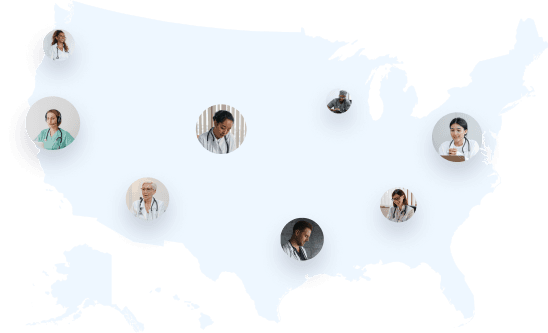The questions in this quiz were adapted from the Yale-Brown Obsessive Compulsive Scale (Y-BCOS). The Y-BCOS is typically administered by a trained clinician. Your results are not a substitute for an OCD diagnosis from a trained medical professional.
Do I have OCD?
Free OCD symptoms test online.
Do you obsess about things to the point it impacts your ability to get through the day? Do thoughts about what might happen if you do something haunt you? Do you repeat rituals to keep your worries at bay? If you do, you could have symptoms of obsessive-compulsive disorder (OCD). Take this quick quiz to dig deeper.
*This test is not a replacement for a diagnosis of OCD from a qualified medical professional and should not be construed as medical advice.
Talk to an experienced OCD specialist

Please specify your state to see available providers ready to see you
Why choose a provider on Klarity Health?
Choose from a growing list of highly skilled, board-certified mental health providers
Access to personalized treatment plans with medication prescriptions if eligible.
Choose what works best for you — pay per visit or find providers who accept insurance
*Your provider will discuss treatment options with you, which may or may not include medication.
FAQs about OCD and OCD tests
Learn more about OCD
See all posts*Appointments are generally available within 24 hours. Prescriptions, particularly for controlled substances, may require an in-person evaluation depending on the state of residence and current federal regulations.
The information provided in this article is for educational purposes only and should not be construed as medical advice. Controlled substances, like Adderall, Ritalin, and others, may not be appropriate for all patients and any mention of these medications is for educational purposes only, not for marketing or encouraging self-diagnosis. Always seek the guidance of a qualified healthcare professional with any questions or concerns you have regarding your health. Providers on Klarity Health are independent practitioners with clinical autonomy. Nothing in this article is intended to diagnose or treat any condition, including guaranteeing prescription medication of any kind or dosage.
If you’re having a mental health crisis or experiencing a psychiatric emergency, it’s crucial to seek immediate help from a mental healthcare professional, such as a psychiatrist, psychologist, or therapist. You can also call your local emergency services, visit your nearest emergency room, or contact a crisis hotline, such as the National Suicide Prevention Lifeline, by calling or texting 988 or dialing the Lifeline’s previous phone number, 1-800-273-TALK (1-800-273-8255) in the U.S.
